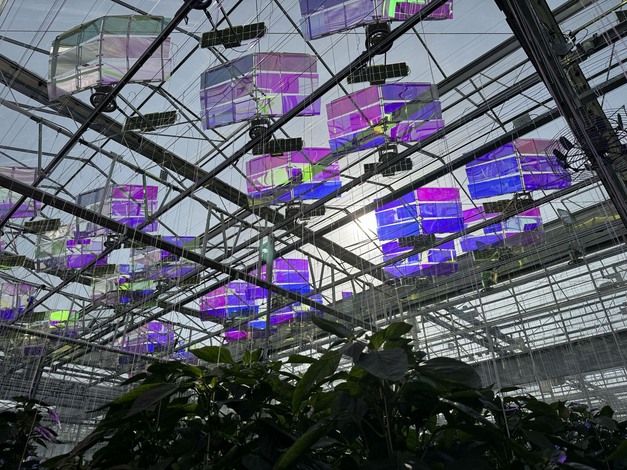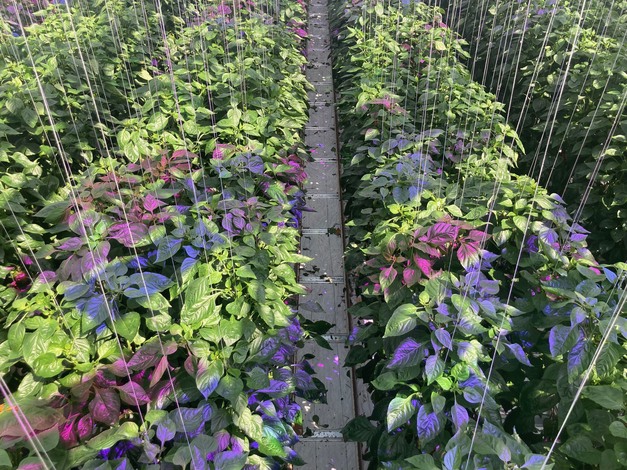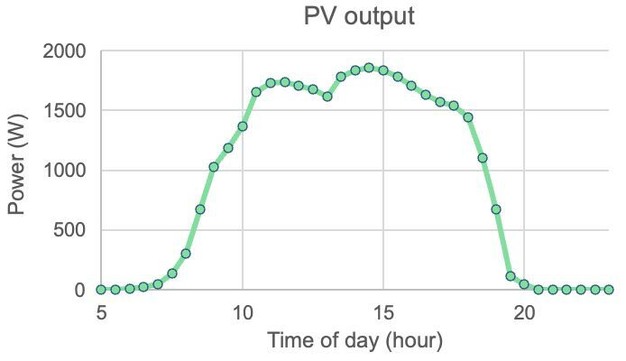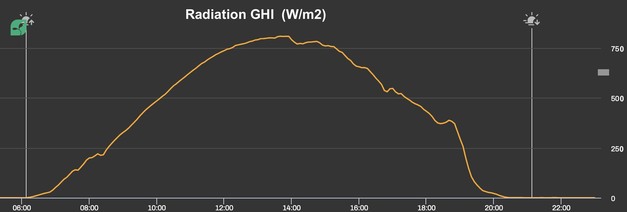A sunny day, fresh pepper plants, and spectral-filtering solar modules. With those ingredients, the team at Voltiris, gained several insight on the energy yield of their solar modules, and how it affects the growing climate underneath. Together with Horconex, the company is currently validating its system at the Delphy Improvement Center in the Netherlands.

"Our modules generated 9.5 hours at peak power on that day, despite the clouds arriving in the late afternoon. Such a flat production profile was made possible thanks to our dual-axis solar tracking system, which provides growers with a production profile better suited for their self-consumption," explained Jonas Roch, CTO at Voltiris.
Voltiris modules work by filtering out green and near-infrared from direct sunlight, thereby reducing the heat absorbed by the plants. "A lower canopy temperature improves the fruit set and the fruit yield in the summer days, as a lower greenhouse temperature allows maintaining higher CO2 concentration levels," Jonas elaborated. Preliminary data recorded on that day indicated that their modules could lower the average plant leaf temperature by as much as 3°C.

"The preliminary data recorded on that day by the climate computer on eight different plant leaf temperature sensors are positive: our modules can lower the average plant leaf temperature by as much as 3°C. Several repetitions of the measurement will be needed to confirm the results," he added.
The background of this trial stems from Voltiris' approach, which involves harnessing energy using spectral filters and solar panels suspended above crops. The filters selectively allow essential frequencies of light to reach the plants while directing the rest toward solar panels for energy production. "The most important energy contribution comes from infrared radiation usually associated with heat. We remove the thermal radiation by turning it into green energy," explained Kaz Vermeer, another member of the Voltiris team, earlier on.


Voltiris sees significant potential for their technology, especially in greenhouse vegetable cultivation. "We see an international drive towards sustainable growth. As a result, electrification is gaining prominence across the industry." The technology also offers potential benefits in other agricultural sectors, such as propagation and ornamental horticulture.
A distinctive feature of Voltiris' approach is its decision not to integrate solar panels into the greenhouse roof but to have them follow the sun's movement. "The efficiency of our unique filter is highly dependent on the angle at which light enters. Fixed angles would result in variable refractions and, consequently, inconsistent light frequencies."
Currently, Voltiris is validating their system at Delphy Improvement Center, with their technology being installed above the shade screen in bell pepper cultivation. To generate maximum solar energy with minimal impact on the crop, greenhouse builder Horconex has lowered the entire underside screen - including motors - by more than a meter in the Delphy greenhouse. This enables the team to use a shade screen in the event of excessive radiation without compromising the PV yield. At the same time, the screen ensures that sunlight is reflected back towards the PV system, thus producing extra energy.
Voltiris has sold out it's full installation capacity for 2024. However, 10 spots have been made available for innovators who'd like to get first-hand experience with a small-scale installation in their greenhouse.
Voltiris is nominated for the GreenTech Award, Category Concept. The winner per category will be announced during the opening of the show on the first day. GreenTech Amsterdam will take place from 11 – 13 June at RAI Amsterdam.
For more information:
Voltiris
kaz.vermeer@voltiris.com
www.voltiris.com
